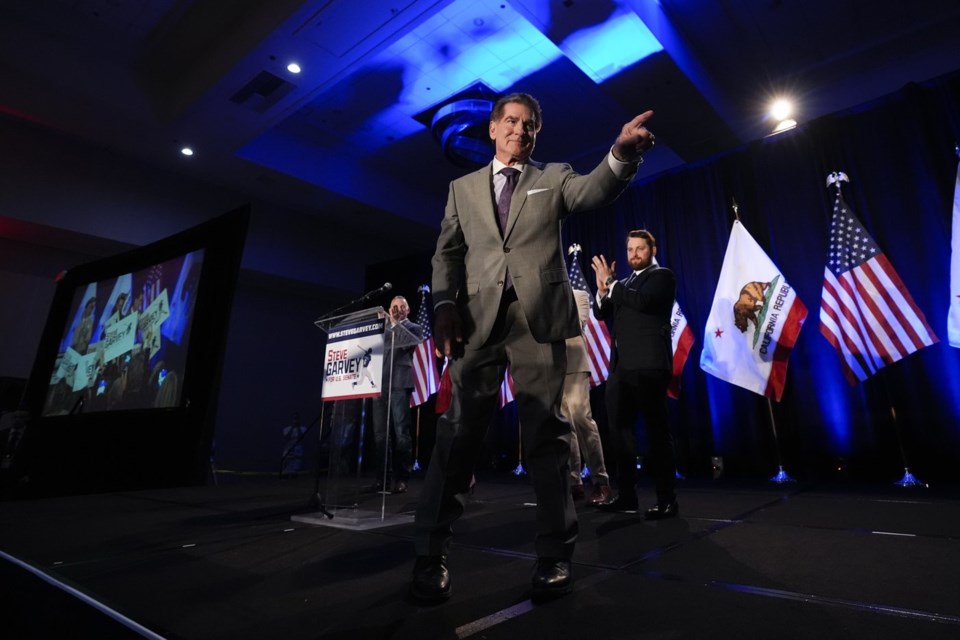SACRAMENTO, Calif. (AP) — Looking to boost his longshot bid for one of California's U.S. Senate seats, Republican Steve Garvey traveled to Israel last month searching for room to run against U.S. Rep. Adam Schiff — a Jewish Democrat known for his support of America's key ally in the Middle East.
It's common for politicians to , a country that's assumed even more importance on the global stage since and Israel's subsequent invasion of Gaza. It's also a way for politicians to bolster their foreign policy credentials — especially for first-time candidates like Garvey.
But Garvey's trip left some political experts puzzled about why the former Major League Baseball star would take on an issue Schiff seemed to have cornered.
“There's really no space for Garvey to grab from Schiff on the Israel-Hamas war,” said Kim Nalder, a political science professor at California State University, Sacramento. “His only possible vulnerability on the topic is from the left, so Garvey's attempt will not connect.”
The trip highlights the difficulties facing Garvey — and every other Republican statewide candidate seeking to connect with voters in this deep blue state. Under California rules, Democrats and Republicans appear on the same primary ballot and the two candidates with the most votes advance to the general election, regardless of political party.
In famously liberal California, hopes were not high for a viable Republican candidate to challenge for the Senate this year, especially given the strong field of Democrats vying for the chance to succeed the late U.S. Sen. Dianne Feinstein — who died in September and was temporarily replaced by now- , who .
But Garvey — the former National League MVP and World Series champion with Â鶹´«Ă˝AVern California’s beloved Los Angeles Dodgers — . Garvey finished Schiff in the March primary for the Senate term that begins in January, the beneficiary of Democrats’ splitting their votes among three sitting members of Congress: Schiff, Katie Porter and Barbara Lee.
And Garvey was for a partial term to fill the Senate seat until the full term kicks in in January.
California voters haven’t elected a Republican to the U.S. Senate since 1988. Democrats control all statewide elected offices, relegating Republicans to a handful of congressional and state legislative districts. Registered Democrats outnumber Republicans in the state by about 2-to-1.
Garvey's trip to Israel was smart because it demonstrated his involvement in a key foreign policy issue for the United States, Republican political consultant Rob Stutzman said. But he said the bigger concern is Garvey’s low-profile California campaign, with few public events and little exposure in the state’s expensive media markets so far.
“When Garvey came along, there was some hopes of having a higher profile kind of Republican Senate nominee that would help down the ballot,” Stutzman said. “At this point, I think you really have to wonder would Republicans be better off with someone younger getting the experience and working harder as a better use of a campaign nomination.”
Garvey, in an interview with The Associated Press, said his campaign has “put a pretty good game plan together” for the general election. He recently spoke at an event organized by megachurch pastor Jack Hibbs. Garvey said he thought his performance in the primary “shocked a lot of people.”
“You’ve got to be careful when you take somebody for granted that’s had the currency of living in California for 50 years” as a high-profile baseball star, he said.
For Garvey, the Israel trip continued what he sees as a theme of his candidacy: “To go where the people of California need answers.” As a candidate, he has visited the U.S.-Mexico border and toured Los Angeles' infamous Skid Row neighborhood known for its large population of homeless people. His trip to Israel came after tensions were high on the campuses of major California universities this spring as were arrested.
“People need a new voice,” he said. “Career politicians have failed them.”
But Garvey's lane to criticize Schiff is narrow. In May, the Biden administration paused a shipment of bombs to Israel to to the country launching an invasion of the southern Gaza city of Rafah. Outraged Republicans in Congress that sought to force the U.S. to send the bombs to Israel anyway.
Schiff voted against that bill, which did not become law. At the time, Garvey called Schiff's vote “a betrayal” of Israel.
“I think, in life, when you’re attacked, especially a country, you have to fight back to protect yourself,” Garvey said.
Schiff said he voted against the measure in part because “House Republicans continue to try to use Israel as a political cudgel.”
In April, Schiff voted for a package that sent to U.S. allies, including Ukraine and Israel. He's been endorsed by the American Israel Public Affairs Committee and has made multiple trips to Israel and the West Bank, which included meetings with Israeli ministers and King Abdullah of Jordan.
“I have supported providing Israel with all the material necessary to defend itself, end Hamas rule of Gaza and obtain the release of all the hostages, even as I have sought to protect innocent civilians and to provide humanitarian assistance,” Schiff said.
In Israel, Garvey met with military commanders and family members of victims of the Oct. 7 attack by Hamas. He also visited the site of a music festival where civilians were killed and prayed at the Western Wall.
“I needed to go over. I needed to take a deeper dive,” Garvey said.
Adam Beam, The Associated Press




